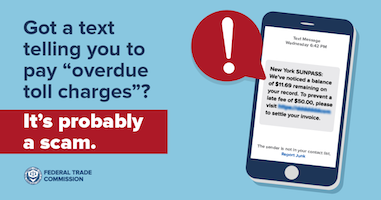There’s been a noted increase in these toll charge scams, with reports suggesting they might be moving from state to state or targeting different regions at different times. The messages typically warn of an outstanding toll amount, urging immediate payment to avoid additional fees or penalties. The amounts mentioned can vary but are often small enough to seem plausible yet urgent. The links provided lead to websites that mimic real toll service sites, asking for personal and payment information.
The scammy text tells you to click a link to pay “overdue toll charges” to avoid late fees. Clicking the link can lead to a phishing attack, where the scammer tries to take your personal information (like your driver’s license number) — and even steal your identity. And if you pay, not only are you out the money, but the scammer gets your credit card number, too.
So, the primary advice is not to click on any links provided in these texts. Instead, check your toll account through the official website or contact the toll service directly using known contact information.
Users are encouraged to report these incidents to platforms like the FBI’s Internet Crime Complaint Center (IC3) or directly to state toll authorities. On X, users often share these experiences to warn others, sometimes using hashtags like #TollScam or #Smishing.
To spot and avoid text scams about a fake toll:
- Slow down. Don’t rush to click on links or respond to the text. Scammers want you to react quickly when they send you an unexpected text message, but it’s best to stop and check it out.
- Check with the tolling agency. If you’re worried the text is legit, check with the state’s tolling agency. But use a phone number or website you know is real — not the info from the text.
- Report unwanted text messages. Use your phone’s “report junk” option to report these unwanted texts to your messaging app or forward them to 7726 (SPAM).
- Don’t engage. Delete the message. Unwanted messages often lead to scams. Once you’ve checked it out and reported it, delete the text message. And don’t engage.
Share this information with people you know so they also can be prepared to spot and avoid the scam. And if you spot a text scam, the FTC wants to hear about it. Go to ReportFraud.ftc.gov and tell us your story.
